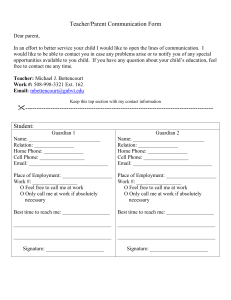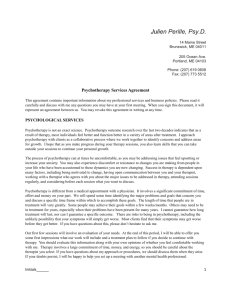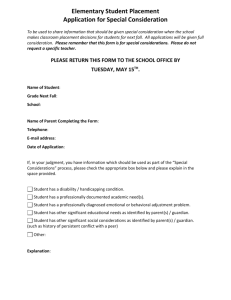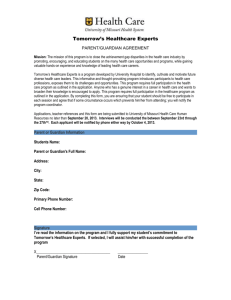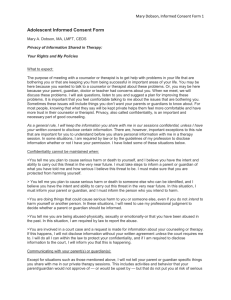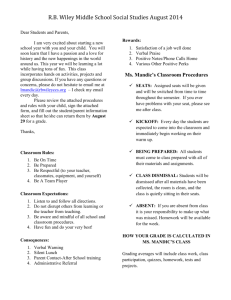Adolescent Disclosure Form
advertisement
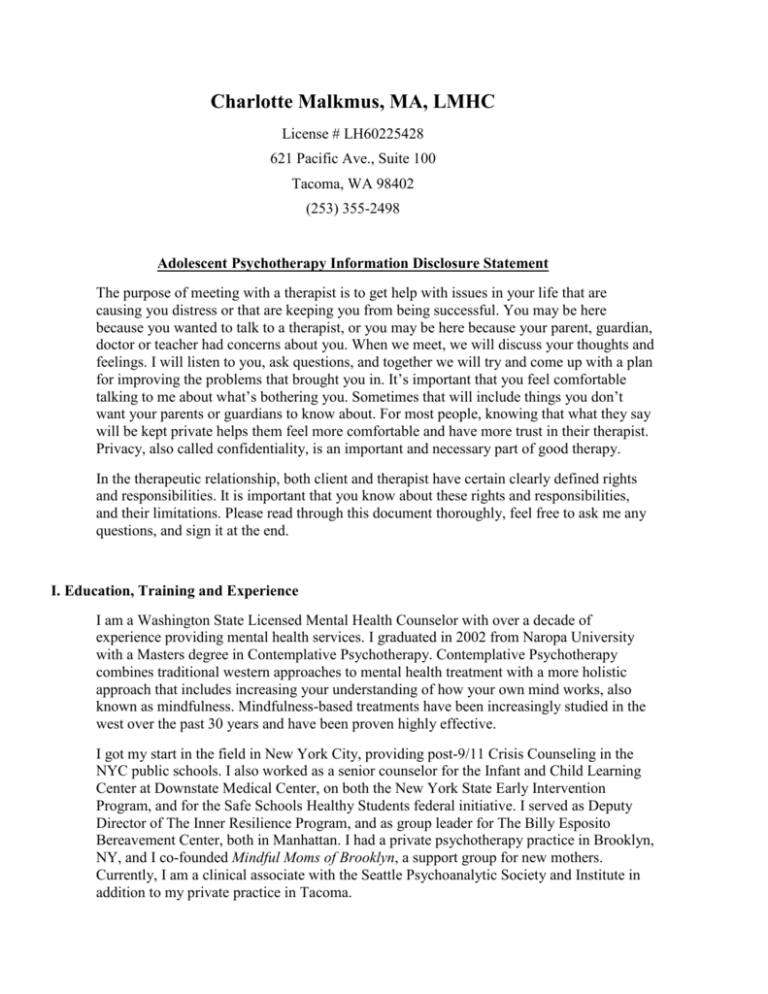
Charlotte Malkmus, MA, LMHC License # LH60225428 621 Pacific Ave., Suite 100 Tacoma, WA 98402 (253) 355-2498 Adolescent Psychotherapy Information Disclosure Statement The purpose of meeting with a therapist is to get help with issues in your life that are causing you distress or that are keeping you from being successful. You may be here because you wanted to talk to a therapist, or you may be here because your parent, guardian, doctor or teacher had concerns about you. When we meet, we will discuss your thoughts and feelings. I will listen to you, ask questions, and together we will try and come up with a plan for improving the problems that brought you in. It’s important that you feel comfortable talking to me about what’s bothering you. Sometimes that will include things you don’t want your parents or guardians to know about. For most people, knowing that what they say will be kept private helps them feel more comfortable and have more trust in their therapist. Privacy, also called confidentiality, is an important and necessary part of good therapy. In the therapeutic relationship, both client and therapist have certain clearly defined rights and responsibilities. It is important that you know about these rights and responsibilities, and their limitations. Please read through this document thoroughly, feel free to ask me any questions, and sign it at the end. I. Education, Training and Experience I am a Washington State Licensed Mental Health Counselor with over a decade of experience providing mental health services. I graduated in 2002 from Naropa University with a Masters degree in Contemplative Psychotherapy. Contemplative Psychotherapy combines traditional western approaches to mental health treatment with a more holistic approach that includes increasing your understanding of how your own mind works, also known as mindfulness. Mindfulness-based treatments have been increasingly studied in the west over the past 30 years and have been proven highly effective. I got my start in the field in New York City, providing post-9/11 Crisis Counseling in the NYC public schools. I also worked as a senior counselor for the Infant and Child Learning Center at Downstate Medical Center, on both the New York State Early Intervention Program, and for the Safe Schools Healthy Students federal initiative. I served as Deputy Director of The Inner Resilience Program, and as group leader for The Billy Esposito Bereavement Center, both in Manhattan. I had a private psychotherapy practice in Brooklyn, NY, and I co-founded Mindful Moms of Brooklyn, a support group for new mothers. Currently, I am a clinical associate with the Seattle Psychoanalytic Society and Institute in addition to my private practice in Tacoma. II. Approach to Treatment In most cases, I meet with people for psychotherapy on a weekly or twice-weekly basis. I also offer psychoanalysis, in which I meet with someone four times a week. Psychoanalysis is characterized by a greater depth and intensity than weekly psychotherapy, and patients in analysis lie on the couch rather than sitting up face to face. Whatever the frequency of sessions, my approach consists of the following qualities: Strengths-focused: Whether working with individuals, couples, or families, I take a strengths-focused approach, attending to people’s inherent resilience and capacity for growth. Mindfulness-oriented: I encourage clients to cultivate an attitude of curiosity towards their experience rather than one of judgment, inviting people to treat themselves with compassion. Embodied: Many therapies treat people from the neck up, ignoring the body. My approach includes a focus on the connection between the mind and the body, which can be highly effective in helping people cope with issues such as severe stress and chronic pain. Collaborative: I view the psychotherapeutic relationship as a collaborative one, and encourage honesty and regular feedback from clients. Culturally competent: I am experienced working with people of diverse religious, ethnic, racial and socioeconomic backgrounds, gender identities and sexual orientations. Resources such as books and articles relevant to a particular type of treatment may be recommended from time to time. III. Confidentiality As a general rule, I will keep the information you share with me in our sessions confidential, unless I have your written consent to disclose certain information. There are, however, important exceptions to this rule that are important for you to understand before you share personal information with me in a therapy session. In some situations, I am required by law or by the guidelines of my profession to disclose information whether or not I have your permission. I have listed some of these situations below. Confidentiality cannot be maintained when: >You tell me you plan to cause serious harm or death to yourself, and I believe you have the intent and ability to carry out this threat in the very near future. I must take steps to inform a parent or guardian of what you have told me and how serious I believe this threat to be. I must make sure that you are protected from harming yourself. > You tell me you plan to cause serious harm or death to someone else who can be identified, and I believe you have the intent and ability to carry out this threat in the very near future. In this situation, I must inform your parent or guardian, and I must inform the person who you intend to harm. >You are doing things that could cause serious harm to you or someone else, even if you do not intend to harm yourself or another person. In these situations, I will need to use my professional judgment to decide whether a parent or guardian should be informed. >You tell me you are being abused-physically, sexually or emotionally-or that you have been abused in the past. In this situation, I am required by law to report the abuse to the Washington state authorities. >You are involved in a court case and a request is made for information about your counseling or therapy. If this happens, I will not disclose information without your written agreement unless the court requires me to. I will do all I can within the law to protect your confidentiality, and if I am required to disclose information to the court, I will inform you that this is happening. Communicating with your parent(s) or guardian(s): Except for situations such as those mentioned above, I will not tell your parent or guardian specific things you share with me in our private therapy sessions. However, if you engage in serious risk-taking behavior, then I will need to use my professional judgment to decide whether you are in immediate danger of being harmed. If I feel that you are in such danger, I will communicate this information to your parent or guardian. Even if I have agreed to keep information confidential – to not tell your parent or guardian – I may believe that it is important for them to know what is going on in your life. In these situations, I will encourage you to tell your parent/guardian and will help you find the best way to tell them. Also, if I meet with your parents, I may sometimes describe problems in general terms, without using specifics, in order to help them know how to be more helpful to you. Communicating with other adults: School: I will not share any information with your school unless I have your permission and permission from your parent or guardian. If I want to contact your school, or if someone at your school wants to contact me, I will discuss it with you and ask for your written permission. A very unlikely situation might come up in which I do not have your permission but both I and your parent or guardian believe that it is very important for me to be able to share certain information with someone at your school. In this situation, I will use my professional judgment to decide whether to share any information. Doctors: Sometimes your doctor and I might need to work together; for example, if you need to take medication in addition to seeing a counselor or therapist. I will get your written permission and permission from your parent/guardian in advance to share information with your doctor. The only time I would share information with your doctor even if I don’t have your permission is if you are doing something that puts you at risk for serious and immediate physical/medical harm. IV. 48- hour cancellation policy If you miss a session without canceling, or cancel with less than 48 hours’ notice, you must pay for that session in full. V. Fees and Insurance The fee for therapy is $140 per session, unless otherwise arranged. Sessions are 50 minutes in length and payments can be made weekly or monthly. I am an Out-of-Network provider for some insurance companies. You may ask me for a bill to submit to your insurance company for reimbursement. VI. Phone calls, emails and texts I use phone calls and emails in-between sessions generally for scheduling purposes only. I ask that you do not text me, and that you email me only to schedule or reschedule a session. There is no way for me to guarantee your privacy if you email or text me with any private information. If you need to speak with me by phone, I will make every effort to return your call within 24 hours. If you find yourself in crisis and need to speak to someone right away, you can call the Pierce County Crisis Line: 800-576-7764. VII. Complaints If you are unhappy with what’s happening in therapy, I invite you to speak with me about it. I assure you that I will take your complaint seriously and address your concerns with respect. If you believe that I’ve been unwilling to listen and respond, or that I’ve behaved unethically, you can bring your complaint to the state governing board for the health professions: Department of Health Health Systems Quality Assurance (HSQA) Complaint Intake P.O. Box 47857 Olympia, WA 98504-7857 360-236-4700 Email: HSQAComplaintIntake@doh.wa.gov Adolescent Consent Form and Parent Agreement to Respect Privacy Adolescent therapy client: Signing below indicates that you have reviewed the policies described above and understand the limits to confidentiality. If you have any questions as we progress with therapy, you can ask me at any time. Signature _______________________________________ Date__________ Notice of Privacy Practices I hereby acknowledge that I have received and have been given an opportunity to read a copy of Charlotte Malkmus’s Notice of Privacy Practices and ask questions. _____________________________________________________________ Signature of Patient/Client Date Parent/Guardian: Please sign below indicating your agreement to respect your adolescent’s privacy: I will refrain from requesting detailed information about individual therapy sessions with my child. I understand that I will be provided upon request with periodic updates about general progress, and that I will be asked to participate in therapy sessions as needed. I understand that I will be informed about situations that could endanger my child. Parent Signature ________________________________________ Date__________ Parent Signature ________________________________________ Date__________
